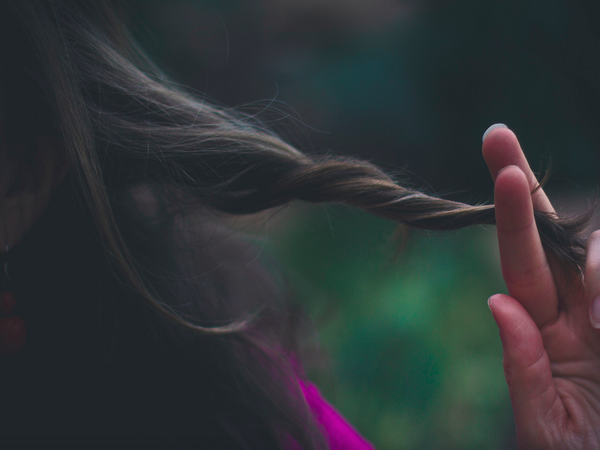Many women would find the idea of a shampoo-free existence incomprehensible, but others swear by it.
The No ‘Poo movement (short for ‘no shampoo’) is becoming an increasingly popular alternative for healthier, more affordable hair treatment.
Shampoo has been around since 1898, when Hans Schwarzkopf created a water-soluble dry shampoo to make hair look and smell nicer.
The reason hair can look dirty and greasy is because of a substance called sebum that your skin naturally produces to help coat and protect hair. Sebum also attracts particles like dust and pollen.
Shampoo became a household product in the 1970s, when marketing campaigns appealed to women’s desire to have nice smelling and looking hair.
The use of shampoo can create a vicious cycle. The skin reacts to shampoo’s attempt to remove sebum from the hair by producing more of it, making the hair look greasier.
No ‘Poo supporters believe that by boycotting shampoo, hair and skin can free itself of external chemicals and produce sebum at a natural rate.
Did the #NoPoo challenge for 5 days and I’m finally washing my hair today. It surprisingly doesn’t feel as disgusting as I thought it would!
— AMANDA (@mandanatasha) April 12, 2015
But I feel sorry for my bf who will have to deal with 6 weeks of greasy hair as I transition out of shampoo. Glad he can’t smell! #nopoo
— Laura Donovan (@LauraDonovanUA) March 21, 2015
There are also claims that shampoo is harming the environment.
The No ‘Poo movement encourages you to experiment and replace shampoo with natural alternatives such as:
- Natural baking soda mixed with water – it’s gentle and can remove chemical build up from hair. Can cause dryness and brittleness to people with dyed hair.
- Apple cider vinegar – it’s a mild acidic and a good replacement for conditioner as it detangles hair follicles. The vinegar odour claims to wear off once dried.
- Beer – it’s a cleanser that can add body to your hair thanks to its B vitamins, wheat products and maltose sugars.
- Just rinse with water – it doesn’t get more natural than that.
Holistic lifestyle coach and blogger, Emily Ehlers, tells upstart that she used to wash her hair up to two times a day before going shampoo-free.
“We absorb so much through our skin and when you start to really read about the chemicals used in conventional products, it can leave you feeling dirty in a different way,” she says.
Ehlers says she started buying organic shampoos but they were really expensive.
“For the first two weeks without shampoo I felt utterly feral and completely unkempt,” she says. “It was summer as well, so that upped the grease factor by a million.”
After trialling No ‘Poo, Ehlers said she wouldn’t be returning to shampoo any time soon.
A photo posted by Emily Ehlers (@emily_ehlers) on
“While the transitional stage was a bit awkward, my hair has come out the other end healthier, thicker and more lustrous. It’s easier to manage and style,” Ehler’s blog post said.
Since writing the post, Ehlers has started using hair products again, although she now sticks to the organic kind.
“After deeming the experiment a success, my further research showed that the natural solution I was using was the equivalent of twice weekly chemical dye jobs in terms of damage to hair,” she says.
“I am still a massive proponent for natural solutions and use my own weekly DIY conditioning treatments–beer, egg, et cetera–but have not yet found a good enough alternative to the baking soda.”
Beauty expert Julyne Derrick said that how often you use shampoo depends entirely on your hair type.
“If you have dry or curly hair, you don’t have to wash your hair every day and quite frankly you shouldn’t,” she said.
“If you have normal hair, you can wash your hair up to five times a week or as needed. You might find you need to wash hair more times in summer when you’re more active.
“For those of us with oily hair, you can wash your hair daily,” she said.
“You’ve probably heard that if you can make it a few days, your oily hair actually stops looking oily. While some women have tried this and swear that by day five their hair finally normalised, when I tried it my hair resembled the inside of a deep fat fryer.”
At the end of the day, experts say that it comes down to personal preference. If you try No ‘Poo and it doesn’t suit your needs, don’t be afraid to start using shampoo again.
Ehlers says that despite No ‘Poo being unsuccessful for her, she has friends who chose to stick with it and are happy with the results.
“So I guess the moral is – experiment,” she says.
Featured image: meeganz, via Flickr.
Joely Mitchell is in her final year of a Bachelor of Journalism degree at La Trobe University. You can follow her on Twitter: @joelymitchell.








